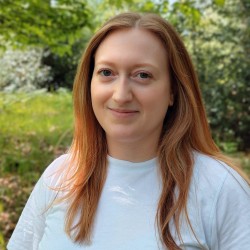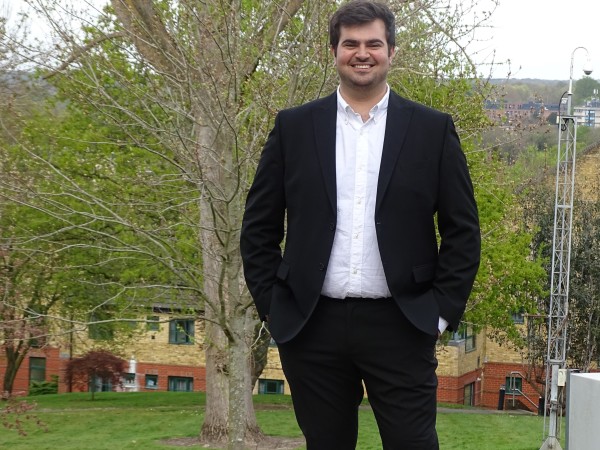
Claire Ramsey
"There are a lot of external speakers on the course, including from the Royal Surrey Hospital and the National Physical Laboratory. They really help to widen your understanding of medical physics applications."
Course
Medical Physics MScEntry year
2021Why did you choose to come to Surrey?
I live on the border of Berkshire and Hampshire so the location of the University was perfect. I am training to become a clinical scientist in nuclear medicine and as part of my training I needed to undertake a masters in medical physics.
What was your first impression when you got here?
It is a bright and friendly place. When I arrived for registration, there was a welcome committee cheering me in which made me smile straightaway. There is a sense of community here and there‘s always something going on.
Why are you passionate about your subject?
I’ve worked in nuclear medicine (a branch of medical physics) for eight years now and I am still learning! Medical physics is always evolving, and learning about new techniques, designs and radiopharmaceuticals from experts in the field is fascinating. I found that the other branches of medical physics deepened my understanding for my own specialism too and that the knowledge behind different modalities is often rooted in the same physics. Plus, I can now tell everyone how an MRI machine works.
Could you tell us about the work you do in nuclear medicine?
Currently, I work as a qualified clinical technologist, but I am training to become a clinical scientist through the ‘Equivalence’ process. My MSc at Surrey will form a large part of my evidence to show that I have enough medical physics knowledge and understanding to be a scientist. Currently, clinical scientists specialising in nuclear medicine are particularly hard to recruit across the UK and there is a high demand to train individuals to this level and keep our services running effectively.
My role as a technologist involves imaging patients using ionising radiation. Many patients who visit nuclear medicine are oncology (cancer) patients and it is a really rewarding job to be able to care for these individuals. Not only do we provide diagnostic services from babies to the elderly, but we also provide therapy, which uses high doses of radiation to destroy diseases. Currently, I am working on my MSc project at the hospital with the aim to optimise our imaging equipment to enhance visualisation and quantification of bone metastases (cancer which has spread to the bones).
Why did you choose to study your course at Surrey?
Rumours! Good ones. I had heard from other people that they wished they had studied at Surrey; everyone from my manager to my friends rated the University very highly.
What do you like about your course?
There are a lot of external speakers, including from the Royal Surrey Hospital and the National Physical Laboratory, and they really help to widen your understanding of medical physics applications.
What are the academic staff and facilities like?
Overall, the academic staff are very supportive and give lots of guidance. You can tell that they want the best for you and will even give you tools and information to help you beyond your course (e.g. specific career information, opportunities).
I love the library study rooms. As part of the course, we had a group project and being able to book out a room equipped with all the tech you need was so useful. All the students seemed to respect the time allocations as well.
"Postgraduate study can be a challenge if you are working at the same time, but with the challenge comes a lot of growth, both personal and professional."
What courses did you study before, and where did you study?
I did my undergraduate degree (with a masters year) in theoretical physics at Swansea University and obtained a postgraduate diploma in healthcare science at the University of Cumbria. Following this, I undertook a MSc module in Reporting Nuclear Medicine images at the University of the West of England.
What are the best things about life in general at Surrey?
As a part-time student who works and lives off-campus, I haven't explored many of the opportunities available at Surrey. I think if I lived here I would enjoy how close Surrey is to the countryside and to London. You can have the best of both worlds.
Do you feel supported at university?
Yes, the staff are invested in your wellbeing and are approachable. There are also regular emails that highlight the wellbeing resources available at Surrey. I have always felt that there was someone I could talk to if I had any concerns about anything.
What has been your best moment at Surrey so far?
Making friends with other students on my course. As a mature student living off campus, I was a little worried about fitting in, but I have made some lovely, kind, like-minded friends. And I’ve inspired some of them to join nuclear medicine!
Do you have any advice for students thinking about postgraduate study?
It can be a challenge if you are working at the same time, but with the challenge comes a lot of growth, both personal and professional.
Do you think you’ve changed since you started at Surrey? How?
At the start of my course, I was very worried about whether I was capable of succeeding; however, I have exceeded my own expectations, and it has really boosted my self-assurance.
Do you have any other comments you’d like to offer about your time at Surrey?
The MSc Medical Physics course offers lots of career support from tutors and external speakers. There are often extra sessions timetabled for anyone interested to learn about a particular career path, and we are regularly emailed with opportunities. I’m very impressed with this part of the course.
Find out about our masters degrees in physics.

